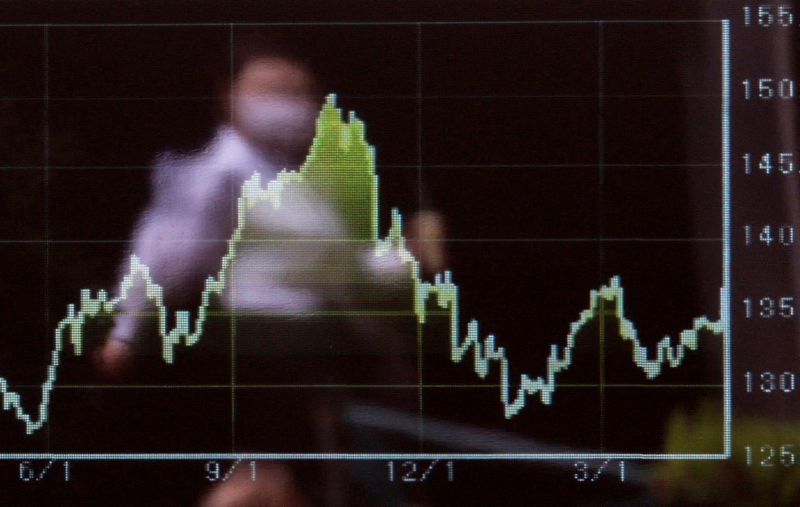By Lucy Raitano and Dhara Ranasinghe
LONDON (Reuters) - Reports of an Israeli attack on Iranian soil that possibly drags the Middle East into a deeper conflict has jolted world markets with geopolitical risks that can swiftly change the direction of anything from oil to bonds and renew inflation risks.
Stocks tumbled on Friday, oil briefly jumped more than $3 a barrel and safe-haven government bonds rallied.
Moves were relatively modest, but the heightened tensions inject fresh uncertainty and fuels concern that high oil prices and potential supply disruptions will keep inflation high.
"Even though these look to be more benign, telegraphed moves between Iran and Israel, and it is not the base case that we get a wider conflict, you probably do need to price in more of a risk premia," said Tim Graf, head of macro strategy for Europe at State Street (NYSE:STT) Global Markets.
Here's a look at the key takeaways for markets.
1/ OH OIL
Oil prices are up roughly 13% so far this year near $90 a barrel and seen staying high.
The International Monetary Fund on Tuesday described an "adverse scenario" in which a Middle East escalation leads to a 15% jump in oil and higher shipping costs that would hike global inflation by about 0.7 percentage point.
Oil supply tightness, and higher prices, have been underpinned by oil producing group OPEC and other big oil producers curbing output.
Morgan Stanley (NYSE:MS) has lifted its third quarter Brent crude oil forecast to $94.
"A geopolitical risk premium appears to have been built in to the oil price, but, clearly, further escalation presents further upside risks," said Thomas McGarrity, head of equities at RBC Wealth Management.
2/ INFLATION ROUND TWO
Spooked by latest hot U.S. inflation numbers, investors are watching oil. It was an energy price surge two years ago that helped drive inflation and rates higher.
High oil prices threaten the downward move in inflation and could prompt a further reassessment of bets on global rate cuts.
A key market gauge of long-term euro zone inflation expectations, which generally tracks oil, on Tuesday hit its highest since December at 2.39%. It remains above the European Central Bank's 2% inflation target.
The ECB has said it is "very attentive" to the impact of oil, which can hurt economic growth and boost inflation.
3/ GO ENERGY STOCKS
Energy stocks are a winner from higher oil prices.
The S&P 500 oil index and European oil and gas stocks hit record highs earlier in April before pulling back.
U.S. oil stocks have jumped almost 12% so far this year, outperforming the broader S&P 500's 5% gain.
Yardeni Research recommends an "overweight" position on energy stocks, seeing a rise in Brent crude to $100 in coming weeks as a possibility.
Oil briefly spiked to around $139 after Russia invaded Ukraine in 2022, its highest since 2008.
"The rise in oil prices complicates central banks' efforts to bring inflation back down to target levels," said RBC's McGarrity. "Having exposure to the energy sector arguably provides the best hedge to both inflation and geopolitical risks in equity portfolios near term."
4/ SAFE-HAVEN RUSH
Demand for safe-havens such as U.S. or German bonds -- especially before the weekend -- trumps the urge to sell bonds given renewed inflation risks from rising oil for now.
U.S. 10-year Treasury yields fell as much as 15 basis points on Friday and were last down 6.5 bps at 4.58%, down from recent five-month highs.
"That suggests markets are more concerned about the need for safe havens than the immediate inflationary implications of higher energy prices," said Investec chief economist Philip Shaw.
The dollar and Swiss franc have also benefited from safe-haven demand, with geopolitics and high oil prices seen adding to a dollar rally fueled by a scaling back of U.S. rate cut bets.
Dollar strength exacerbates pressure on economies such as Japan grappling with a yen at 34-year lows, with traders nervy over possible central bank intervention.
ING currency analyst Francesco Pesole said a further Middle East escalation could see losses for currencies in New Zealand, Australia, Sweden and Norway as risk sentiment takes a hit; the Swiss franc could rally further.
5/ FRESH EM PAIN
Rising oil prices and a strong dollar also hurts emerging markets, such as India and Turkey, that are net oil importers.
India's rupee hit record lows this week.

Even for Nigeria and Angola, typically Africa's largest oil exporters, weakening local currencies and rising fuel prices have hit government coffers due to capped gasoline pump prices and a lack of local oil refining.
"A return to $100+ in oil prices may convince the Fed to throw in the towel on hopes of monetary easing for now, and a potentially magnified impact across EM currencies of geopolitical risk would fuel a substantial rotation back to the dollar," said Pesole.